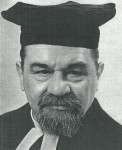Rabbi Brodie & the Australian Ministry
There is a rabbinic saying, “The person who has eaten the dish, he knows its ta’am, its taste”.
One might fittingly paraphrase these words and say, if a community has come under the influence of a memorable rabbi, that community, even years later, still savours his personality, his presence, indeed his ta’am.
 What was the ta’am of Rabbi Sir Israel Brodie?
What was the ta’am of Rabbi Sir Israel Brodie?
He was a man destined from his youth for the rabbinate and for greatness. The son of a pious couple from Newcastle-upon-Tyne who struggled to ensure that he could be learned in the ways of Kovno and educated in the approach of Oxford. A young man who at Jews’ College was already spoken of as a future Chief Rabbi, who went to serve as a chaplain in the First World War and as a social welfare worker in the immediate post-war period.
A minister who recognised that distant Australia would give him experience and maturity and stretch his thinking – who knew that Melbourne was a spiritual challenge where very few people spoke his language.
If anyone worked to inject Jewish quality into Melbourne it was he.
His youth club – the members are known still as “Rabbi Brodie’s boys” – his impressive, classical-style preaching, his mellifluous conduct of services, his tolerant understanding of people, his fascinating public lectures (more than once the Synagogue hall was too small for the crowds that came, and the lectures were moved into the Synagogue itself), his passionate loyalty to tradition (he would sit and “learn” with the old-timers at the Montefiore Home to maintain his own rabbinic studies), his determined advocacy of the Zionist cause… to these were added his masonic and public relations work, especially at the critical moment when Nazism arose and he proved a consummately effective ambassador of our people.
My own parents were among his great admirers and he was good enough when he inducted me at Hampstead to recall that he had known me and my family for many years and had watched me prepare myself for the ministry.
He left Melbourne in 1937 pessimistic about the survival of Australian Jewry. Events proved him wrong and he was delighted to see the great positive advances that the Australian community made in more recent decades.
He returned to the academic life but was soon needed again for war service. His uniform was not always too tidy but he had a remarkable relationship with the men. He kept up morale and attracted affection wherever he went.
After the war, there was another brief period of academic life and then he became Chief Rabbi.
As one of his ministers I was immensely proud of the Chief’s special ta’am. He had a presence, quiet, courtly, with a mildly episcopal dignity. Our elocution lecturer at College rightly regarded him as one of the finest preachers in England, with a sonorous voice, an elegant, measured, Biblical turn of phrase, and a wonderful way with a Midrash.
His failing was perhaps that he was too much a scholar and a gentleman for the rough and tumble of communal politics. He would not exploit his own position for cheap, unedifying self-aggrandisement, nor could he take the belittling, the undermining, or the impudence, of some who brought little honour to the community. He would passionately but politely defend the right as he saw it, but he suffered from the harshness of communal conflict and in the end his health was affected.
Then, when the heat of battle was finally done and he retired, at the age of 70, he returned to what he called “the still waters of academic tranquility”. He inducted his successor in a moving ceremony. As the years of his retirement went on he became more and more secure in the affections of a grateful community in England and abroad, especially in Australia which he revisited from time to time.
He loved to entertain Australians in London. He remained good company to the end. I saw him last in November, 1978; he was rather frail, but the humour, the humanity, the understanding, the sound wisdom, the remarkable memory, all were vibrant. He had a soft spot for Sydney – in fact he had warmly encouraged my wife and me to come here – and both he and Lady Brodie asked after many dear friends here.
He died in February 1979. He had served his Maker and his people well.
The above article originally appeared in print in 1980.
See also Kovno & Oxford: Israel Brodie & his rabbinical career



